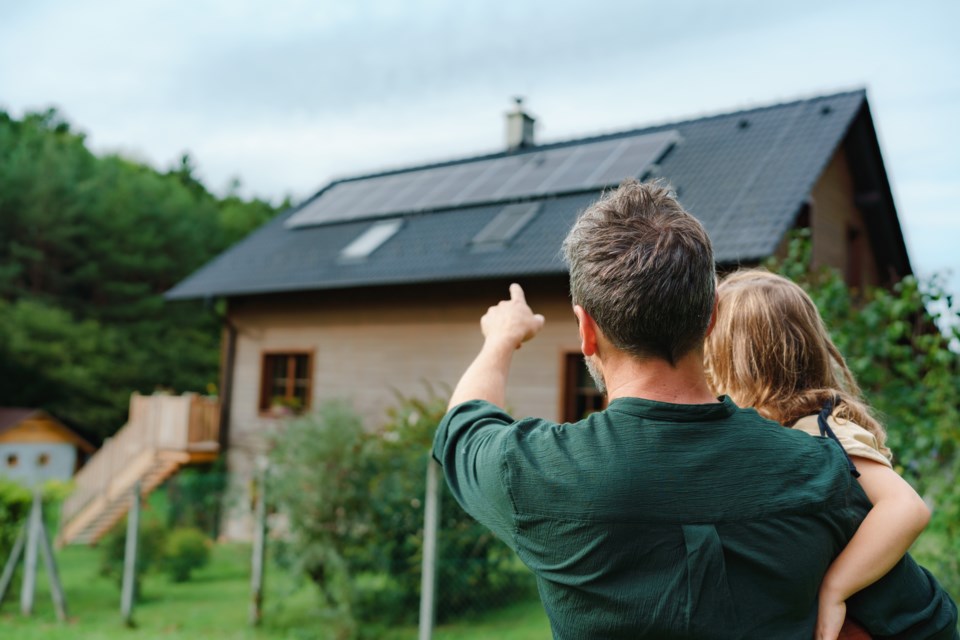The City of Greater Sudbury is committed to becoming climate-resilient and hitting net-zero carbon emissions by the year 2050. It has a detailed plan in place to get there, and the recently released Climate Action Annual Report 2022 provides a window into how these efforts are progressing.
Achieving net-zero emissions requires a balance between the amount of greenhouse gases (GHG) emitted and the amount removed. The first step is to reduce energy use; the second is to generate and use clean or renewable energy.
Did you know that the City has built and maintained two large solar panel roofs that produce electricity? Panels were installed on two buildings in 2015—the Gerry McCrory Countryside Sports Complex and Pioneer Manor Long-Term Care Home—and in 2022 alone they generated 395,124 kwh. In fact, green retrofits done by the City in the last 10 years have saved more than $2.6 million. (Source: Cbc.ca)
Community efforts
As a community, we can also install solar panels—on our homes, commercial buildings, garages and cottages. Everyone can participate and share in the benefits.
There are many advantages to going solar, including:
- saving on monthly electricity bills
- reducing carbon emissions
- taking advantage of government tax rebates, incentives or initiatives
- increasing the value of your home or business (by about four per cent, according to one U.S. source)
- using a clean, renewable energy source that helps the environment
Many people put solar panels on their cottages. If you are adding solar to a cottage or a garage that does not have any electricity, this is a particularly smart move; it saves on propane, eliminates the need for a gas generator and adds convenience.
The average life span of solar panels is about 25 to30 years. Some can even last up to 50, though their efficiency decreases by about 0.8 per cent each year. (Source: EcoWatch)
Local success story
In Little Current, Ontario, Craig Timmermans and his wife, KT, run a radio station entirely off-grid. Timmermans is the owner and CEO of Manitoulin Broadcasting Corp., which runs two radio stations on Manitoulin Island, Country 103 FM and Hits100 FM.
Thanks to his investments in renewable energy, his studio/office complex is completely off the grid and the electrical bills for his transmitter are down 80 per cent. His stations run on predominantly solar and wind power. In fact, Country 103 is Canada’s greenest—and only—net-zero radio station. (Source: Radio World, June 23, 2021)
Doing it yourself
The one drawback to solar panels is that maintenance can be an issue. Thankfully local training is available for people on how to install and maintain their own solar panels. This education is key, because if any issues arise it is both difficult and costly to find contractors who can perform repairs, especially in the north.
Steve Deforge of Solar Associates and his business partner, Operations Manager Scott Seidel of the North American Solar Academy, are helping to train the Atikameksheng Anishnawbek to install their own systems. They work with several First Nations communities all across the north.
“Anyone can learn in a reasonable amount of time to be a solar system installer,” says Deforge. “The actual installation process isn’t rocket science and anyone with simple construction knowledge could do it, as long as they learn the skill from a qualified and knowledgeable installer.”
Buyer beware
Unfortunately, over the years he has seen the good, the bad and the ugly when it comes to installation issues. Most homeowners and business owners who choose to install solar panels don’t go through the process of learning the intricacies of repairing orservicing their solar equipment.
“It is very important to choose the right solar company, one that offers after-installation services too. Many companies say they do, but they actually don’t,” he warns. Ideally, the products the company installs are so high-quality that there are little to no repairs or service needed for a very long time.
The industry is unregulated, Deforge cautions, so anyone can start a solar company and begin installing solar energy systems. That’s why customers must do their due diligence and training is so important.
“We work closely with the North American Solar Academy who specialize in solar energy training, from the installation to the EPC (Engineering, Procurement and Construction). The solar panel system is just a small part in the whole process—from hydro applications, engineering, site evaluation, equipment ordering, Electrical Safety Authority permits/inspections and finally system installation,” he says.
Additional resources & reading
For any businesses who are interested in learning more, visit reThink Green’s Green Economy North. They help business owners who are considering installing solar panels work towards their climate goals.
Learn more about the City of Greater Sudbury’s commitment to reducing greenhouse gases and helping the community achieve net-zero goal by 2050.
If you have a project you’d like the City to highlight, contact Jennifer Babin-Fenske at [email protected].
